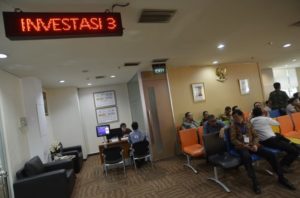A JAB TO THE SYSTEM: JOKOWI’S REGULATORY REBOOT

President Joko Widodo may need to shake up the system to get rid of regulatory roadblocks in Indonesia. (Antara Photo/Yudhi Mahatma)
.
Jakarta. Several years ago, President Joko “Jokowi” Widodo, who was then Jakarta’s governor, almost punched one of his subordinates for dragging a business license application process into a labyrinthine bureaucratic hell for the applicant.
It was a rare show of rage for the usually composed Javanese man who had seen firsthand — as a furniture business owner in his hometown of Solo in Central Java — how greatly bureaucratic inefficiency can damage businesses.
Not surprisingly, deregulation efforts have been among Jokowi’s top priorities. The president’s 2016 policy packages were a resounding success, as they merged the application processes for company certificates and trading licenses, and slashed capital requirements.
Indonesia moved to the 91st place in the World Bank’s “Ease of Doing Business” list this year, from the 106th a year ago — the first double-digit jump in the ranking in the country’s history.
The president is setting himself up for more ambitious regulatory moves, with his administration already preparing a presidential regulation that will integrate all business licensing paperwork by the end of March.
Soon businessmen will only need to submit applications and documents once, and the system will process them automatically, instead of requiring the applicants to move from office to office to obtain all the necessary permits.
Unlike his predecessors, Jokowi has set a clear and measurable goal for his administration’s regulatory reboot: climb up to the 40th place in the “Ease of Doing Business” ranking — now occupied by Russia — by 2019.
Coordinating Economic Affairs Minister Darmin Nasution said the presidential regulation will try to break the “chains of permits,” which often get businessmen caught in a bureaucratic snarl, and can delay licensing processes for years.
But some say Jokowi’s latest reform still leaves fundamental problems untouched.
“The presidential regulation only addresses the process of business licensing and issuing permits,” said Robert Na Endi Jaweng, the executive director of Regional Autonomy Watch (KPPOD), a non-governmental watchdog for decentralization.
“Whether that regulation will be implemented at the regional level is a different story,” Endi said.
According to a KPPOD study, implementing the government’s previous deregulation policies at the regional level proved almost impossible, since current laws grant sizable power to local governments.
One example: a Dutch colonial-era law that requires businesses to secure a “nuisance permit,” known as HO or Hinder Ordonnantie, from local governments.
The central government tried to remove the requirement last year by abolishing a ministerial regulation that dictates the procedure for administering the permit process, arguing that without the procedure local governments will be unable to implement it. But only a few regions complied.
Others, unwilling to lose income from the permit fees, kept the requirement intact, saying that it is mandated by the law.
A “reward or punishment” system for regional governments seems ineffective. Under the 2014 Local Governance Law, the central government can cut transfer of budget to regional governments for repeated breaches of higher laws.
The transfer amount, however, goes up every year, even to repeat-offender regions, with the central government seeming hell-bent on increasing public spending to boost economy.
Darmin admitted that the latest regulatory reform will not involve any fundamental change in the laws. Instead, the central government will rely on special task forces to impose standards on licensing across various institutions.
The government will also create task forces to help businesses in going through the complicated application processes.
“We hope licensing, which used to take three or five years, will now take just one year. And ones that used to take one year will be done in only three months,” Darmin said.
Given the limited number of ministerial staff for the task forces, it is unlikely that micro, small and medium size businesses would ever enjoy the special treatment, though they are more likely to suffer from the complicated licensing at the ground level.
Small businesses face many challenges right from the get-go. Before opening up shops, they need to secure permissions from neighbors, as well as permits from the urban ward and sub-district office.
For each of these, they will also be forced to fork out money for illegal charges, which could cost them north of Rp 3 million ($225).
“The requirement to secure the approval of one’s neighbors makes them think they are entitled to accept or refuse the proposal,” KPPOD’s Endi said.
He added that the requirement also unwittingly subjects business people to possible racist or discriminatory treatment fanned by spiteful neighbors or competitors.
The KPPOD study concluded that the 2009 Law on Regional Taxes and User Charges encourages local rulers to impose a plethora of fees that businessmen say “simply don’t make any sense.”
One ice cream seller in Bandung has to send ice cream to an entire division in the city’s district office every year to secure an annual tourism recommendation, which he said offers no benefit to his business.
Regulatory complications and exorbitant costs to open up a business make fewer businesses transit from the informal sector to the formal sector.
A registered business is able to take up loans from banks or partner with larger companies to expand.
Finance Minister Sri Mulyani Indrawati said she would like to see more SMEs register themselves as legitimate businesses, which will also allow the government to expand its tax base.
Taking into account the Gordian knot of regulatory roadblocks the government is already facing, Endi said the current administration “may need to consider moving from an incremental approach, to a more fundamental shakeup.”
In other words, it may be time for the president to throw a real punch or two, not at his subordinate, but to the system.









